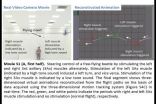(Press-News.org) A new study from the University of Birmingham and the MRC Cognition and Brain Sciences unit in Cambridge has shown how intentional recall is beyond a simple reawakening of a memory; and actually leads us to forget other competing experiences that interfere with retrieval. Quite simply, the very act of remembering may be one of the major reasons why we forget.
The research, published today in Nature Neuroscience, is the first to isolate the adaptive forgetting mechanism in the human brain. The brain imaging study shows that the mechanism itself is implemented by the suppression of the unique cortical patterns that underlie competing memories. Via this mechanism, remembering dynamically alters which aspects of our past remain accessible.
Dr Maria Wimber, from the University of Birmingham, explained, "Though there has been an emerging belief within the academic field that the brain has this inhibitory mechanism, I think a lot of people are surprised to hear that recalling memories has this darker side of making us forget others by actually suppressing them."
Patterns of brain activity in the participants were monitored by MRI scans while they were asked to recall individual memories based on images they had been shown earlier.
The team, co-led by Dr Michael Anderson from the MRC Cognition and Brain Sciences Unit Cambridge, were able to track the brain activity induced by individual memories and show how this supressed others by dividing the brain into tiny 3-dimensional voxels.
Based on the fine-grained activation patterns of these voxels, the researchers were able to witness the neural fate of individual memories as they were reactivated initially, and subsequently suppressed.
Over the course of four selective retrievals the participants in the study were cued to retrieve a target memory, which became more vivid with each trial. Competing memories were less well reactivated as each trial was carried out, and indeed were pushed below baseline expectations for memory, supporting the idea that an active suppression of memory was taking place.
Dr. Anderson said "People are used to thinking of forgetting as something passive. Our research reveals that people are more engaged than they realise in shaping what they remember of their lives. The idea that the very act of remembering can cause forgetting is surprising, and could tell us more about selective memory and even self deception."
Dr Wimber continued, "Forgetting is often viewed as a negative thing, but of course, it can be incredibly useful when trying to overcome a negative memory from our past. So there are opportunities for this to be applied in areas to really help people."
The team note that being able to decode how the brain goes about suppressing competing information needs to be acknowledged in a number of situations; not least in the judicial process.
Dr Wimber said, "It has significance for anything that relies on memory, but a really good example is that of eyewitness testimonies. When a witness is asked to recall specific information about an event, and they are quizzed time and time again, it could well be to the detriment of associated memories - giving the impression that their memory is sketchy. In fact, the repeated recall is causing them to forget these details."
The findings of this research are not restricted to specific memory types. Semantic memory, episodic memory and even recently acquired short-term memories are impacted by the forgetful side effect of frequent recall.
Though people differ genetically, it is believed that all brains are capable of inducing varying degrees of this forgetting mechanism.
Studying the neural basis of forgetting has proven challenging in the past because the 'engram', that is, the unique neural fingerprint that an experience leaves in our memory, has been difficult to pinpoint in brain activity. By capitalising on the relationship between perception and memory, the study detected neural activity caused by the activation of individual memories, giving a unique window into the invisible neurocognitive processes triggered when a reminder recapitulates several competing memories.
INFORMATION:
The largest genetic study of tuberculosis (TB) susceptibility to date has led to a potentially important new insight into how the pathogen manages to evade the immune system. Published today in the journal Nature Genetics, the study advances understanding of the biological mechanisms involved in TB, which may open up new avenues to design efficient vaccines for its prevention.
TB, caused by infection with the pathogen Mycobacterium tuberculosis, is a major global public health problem. According to the World Health Organization, in 2013 nine million people fell ill with ...
A Venezuelan evolutionary biologist and a US zoologist state that they have refuted, through mitochondrial DNA sequencing, a recent claim, also based on such sequencing, that unknown type of bear must exist. in the Himalayas and that it may be, at least in part, the source of yeti legends. Their study was published in the open access journal ZooKeys.
Last year, B. Sykes and co-authors, in the course of mitochondrial DNA sequencing identification of hair samples that had been attributed to "anomalous primates" (yetis, bigfoots, and others), claimed to have found that ...
Berkeley -- Hard-wiring beetles for radio-controlled flight turns out to be a fitting way to learn more about their biology. Cyborg insect research led by engineers at the University of California, Berkeley, and Singapore's Nanyang Technological University (NTU) is enabling new revelations about a muscle used by beetles for finely graded turns.
By strapping tiny computers and wireless radios onto the backs of giant flower beetles and recording neuromuscular data as the bugs flew untethered, scientists determined that a muscle known for controlling the folding of wings ...
In the face of global climate change, increasing the use of renewable energy resources is one of the most urgent challenges facing the world. Further development of one resource, solar energy, is complicated by the need to find space for solar power-generating equipment without significantly altering the surrounding environment.
New work from Carnegie's Rebecca R. Hernandez (now at University of California Berkley), Madison K. Hoffacker, and Chris Field found that the amount of energy that could be generated from solar equipment constructed on and around existing infrastructure ...
Northwestern University scientists have developed a robust new material, inspired by biological catalysts, that is extraordinarily effective at destroying toxic nerve agents that are a threat around the globe. First used 100 years ago during World War I, deadly chemical weapons continue to be a challenge to combat.
The material, a zirconium-based metal-organic framework (MOF), degrades in minutes one of the most toxic chemical agents known to mankind: Soman (GD), a more toxic relative of sarin. Computer simulations show the MOF should be effective against other easy-to-make ...
"Warmer air transports more moisture and hence produces more precipitation - in cold Antarctica this takes the form of snowfall," lead author Katja Frieler from the Potsdam Institute for Climate Impact Research (PIK) explains. "We have now pulled a number of various lines of evidence together and find a very consistent result: Temperature increase means more snowfall on Antarctica," says Frieler. "For every degree of regional warming, snowfall increases by about 5 percent." Published in the journal Nature Climate Change, the scientists' work builds on high-quality ice-core ...
Researchers have discovered a valley underneath East Antarctica's most rapidly-changing glacier that delivers warm water to the base of the ice, causing significant melting.
The intrusion of warm ocean water is accelerating melting and thinning of Totten Glacier, which at 65 kilometres long and 30 kilometres wide contains enough ice to raise global sea levels by 3.5 metres. The glacier is one of the major outlets for the East Antarctic Ice Sheet, which is the largest mass of ice on Earth and covers 98 percent of the continent.
Climate change is raising the temperature ...
CORVALLIS, Ore. - A new study confirms that snowfall in Antarctica will increase significantly as the planet warms, offsetting future sea level rise from other sources - but the effect will not be nearly as strong as many scientists previously anticipated because of other, physical processes.
That means that many computer models may be underestimating the amount and rate of sea level rise if they had projected more significant impact from Antarctic snow.
Results of the study, which was funded by the National Science Foundation, were reported this week in the journal ...
About one quarter of the global seafloor is extremely nutrient poor. Contrary to previous assumptions, it contains oxygen not just in the thin surface layer, but also throughout its entire thickness. The underlying basement rocks contain oxygen as well. An international research team made these new discoveries through analysis of drill cores from the South Pacific Gyre.
In the latest issue of Nature Geoscience the scientists also point out the potential effects on the composition of Earth's interior because oxygen-containing deep-sea sediment has a different mineral composition ...
The underlying mechanism behind an enigmatic process called "singlet exciton fission", which could enable the development of significantly more powerful solar cells, has been identified by scientists in a new study.
The process is only known to happen in certain materials, and occurs when they absorb light. As the light particles come into contact with electrons within the material, the electrons are excited by the light, and the resulting "excited state" splits into two.
If singlet exciton fission can be controlled and incorporated into solar cells, it has the potential ...

